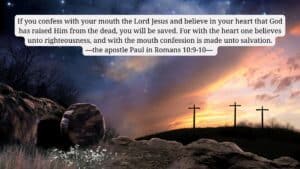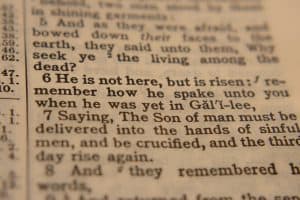You must be asking which door is the true one; not which pleases you best.
On the back of Satan’s neck is a nail scarred footprint.
—C. S. Lewis—
Key point: You show me an authentic Christian, and I’ll show you someone who hasn’t bought into the idea that all opinions are equally valid. In other words, he or she has rejected relativism and realizes it is incompatible with Christianity.
A reproducible PDF file of this post is available here.
A companion article titled “The True Meaning of Christmas Deals a Death Blow to Relativism” is available here.
On the Wednesday before Easter in 2021 — March 31 — I published an article titled “The Meaning of Jesus’ Resurrection.” In it, I highlighted fifteen things that Jesus’ resurrection validated or proved. You can access the online article here and a PDF file carrying the fifteen-item list here.
As I said at the time, “My list is not exhaustive, but it does include some very important items. It shows the connections between the resurrection and a host of other realities that are consistent with it.”
On this Easter weekend, I want to hone in on the second item on the list: “Jesus’ resurrection demonstrates conclusively that right and wrong exist, that absolutes exist, and that God is holy and must judge sin.” If absolutes exist, the prevailing approach to making moral and ethical decisions today — relativism — is totally false (regardless of the fact it makes its adherents feel noble and magnanimous). Appearances often deceive.
Relativism actually is an inherently flawed ideology to begin with. If you doubt this, you ought to read Greg Koukl’s list of “Seven Things You Can’t Do as a Relativist.” Learn more here. Yet, despite relativism’s glaring inconsistencies, even many self-proclaimed Christians have bought into the idea that one person’s opinion as good as another, and even that one person’s approach to knowing God is just as valid as all others. Mark it down. To justify believing this and to be intellectually honest, one must explain away the death and resurrection of Jesus. That, my friend, is a lot tougher than most people think. In a few moments, we will return to the matter of relativism versus absolute truth; but first, let’s briefly explore some basic information about Jesus’ life and ministry, including His death and resurrection.

Who Is Jesus?
It is almost universally affirmed that Jesus was a great teacher. If such a teacher, then what He taught was true. His teachings, to a large extent, were about Himself. If Jesus was a good teacher, then He was a reliable one, and He spoke the truth. He could not have been a liar (one intentionally deceiving others) or a lunatic (deceived about Himself and spreading falsehoods about Himself He genuinely believed to be true). Nor could he have been a legend, considering the fact that those who spoke and wrote about Him, His miracles, and His claims were eyewitnesses. He had to have been God, just as He claimed to be.

Moreover, if He was and is God (who is holy), then what He taught about His death also had to be true. Not only did Jesus predict his death and resurrection on at least three separate occasions, but He did so accurately. Deny Jesus rose from the dead if you wish, but if you do, please explain to me why 1) His enemies didn’t parade the body through the streets of Jerusalem, or 2) why the remaining eleven disciples (save Judas, who betrayed Him and killed himself) served Him with abandon the rest of their lives, which included, for all but one of the eleven, dying a martyr’s death.
Those who say Jesus’ disciples stole the body and preached Jesus had risen from the dead, even when they knew it was a lie; are living in a fantasyland of their own making. Among Jesus’ followers, the men were amazed, and the women were stunned. Besides, no would-be grave robber, whether friend or foe, could have taken the body and left the grave clothes in the tomb. That simply wouldn’t have been possible.
Being a Christian Means Believing Jesus Rose from the Dead After Dying to Pay the Penalty for Human Sin
In 1 Corinthians 15:1-8, the apostle Paul wrote to the believers in Corinth,
151 [B]rethren, I declare to you the gospel which I preached to you, which also you received and in which you stand, 2 by which also you are saved, if you hold fast that word which I preached to you—unless you believed in vain.
3 For I delivered to you first of all that which I also received: that Christ died for our sins according to the Scriptures, 4 and that He was buried, and that He rose again the third day according to the Scriptures, 5 and that He was seen by Cephas [Peter], then by the twelve. 6 After that He was seen by over five hundred brethren at once, of whom the greater part remain to the present, but some have [already died, or] fallen asleep. 7 After that He was seen by James, then by all the apostles. 8 Then last of all He was seen by me also, as by one born out of due time.
In Romans 10:9-10, Paul described how a person can be saved, or how he or she can be forgiven of sins and receive eternal life:

109 that if you confess with your mouth the Lord Jesus and believe in your heart that God has raised Him from the dead, you will be saved. 10 For with the heart one believes unto righteousness, and with the mouth confession is made unto salvation.
While many Christians have heard these verses before, we do well to explore the foundational truths on which they rest.
Note that in 1 Corinthians 15:3, Paul wrote that Jesus “Christ died for our sins.” What is a sin? Romans 3:23 tells us; it says that “all have sinned and fall short of the glory of God.” To sin means to “fall short” of the target, or to “miss the mark.” The “mark” in this case is God’s standard of holiness and righteousness. Since God is perfect, it is no wonder that “all have sinned.” We sin because we have inclinations to sin, but also because we willfully choose to. Ecclesiastes 7:20; Jeremiah 17:9; and Psalm 14:1-2-3 echo the truth that every human being is a sinner. All people — without exception — have failed to meet God’s standard of righteousness. We’ve broken God’s law and stand guilty before Him.
If relativism were true, everybody’s standard of right and wrong, including God’s, would be just as valid as everyone else’s. However, because God’s standard is absolute and applies universally, all are guilty of disobeying God and must suffer the consequences. In this sense, God’s perspective is the only one that matters. Romans 6:23 tells us that “the wages [or penalty] of sin is death.” The death referred to here is eternal death — separation from God forever.

God’s Rescue Operation
Robert Laidlaw (1885-1971), a Christian businessman, wrote a letter to his employees explaining why he believed in the God of the Bible and was a Christian. He called his presentation “The Reason Why.” Laidlaw wrote in part,
After addressing a meeting on one occasion, a young man asked me, “Do you think it fair of God to set the standard of holiness so high that we cannot reach it, and then judge us for falling short?” I replied, “God has not set an arbitrary standard of holiness. He has not really set a standard at all; He is the standard. He is holiness in the absolute—holiness personified—and to preserve His own character, He must maintain that absolute standard in all His dealings with man, irrespective of the tremendous problems it creates for both Him and us.”
The Bible tells us that God loved human beings, even though they had sinned. He wanted them to have fellowship with Him, but in their sinful state, they could not; and, unless things changed, they never would be able to. But how could things change? They could change only if God intervened and paved the way for sin’s penalty to be paid. This would make it possible for human sins to be forgiven. There was only one way this could happen, and it would be very costly. John tells us about it what we now know as chapter 3 of his Gospel:

316 For God so loved the world that He gave His only begotten Son, that whoever believes in Him should not perish but have everlasting life. 17 For God did not send His Son into the world to condemn the world, but that the world through Him might be saved.
18 “He who believes in Him is not condemned; but he who does not believe is condemned already, because he has not believed in the name of the only begotten Son of God. 19 And this is the condemnation, that the light has come into the world, and men loved darkness rather than light, because their deeds were evil.20 For everyone practicing evil hates the light and does not come to the light, lest his deeds should be exposed. 21 But he who does the truth comes to the light, that his deeds may be clearly seen, that they have been done in God.”
God sent His only Son, Jesus, on a rescue mission. This was the ultimate of all rescue missions. Jesus Christ, who, as a member of the triune Godhead (consisting of God the Father, God the Son, and God the Holy Spirit) was God and was therefore perfect and without sin. He became a man, lived a perfect life, and died by crucifixion. His was a horrific death that was both physical and spiritual. Yet all of this was God’s plan, a plan that has made it possible for everyone who confesses that Jesus is Lord and believes God has raised Him from the dead to be forgiven of his or her sins and be saved.
“Who crucified Jesus? First and foremost, all people did, including you and me. But God the Father also did, and Jesus laid down His life willingly, in order to accomplish the divine rescue mission.
Jesus was crucified on a Passover Friday and was buried. He was dead, but he didn’t stay dead. He rose from the dead on the following Sunday morning, just as all four of the Gospel writers declared in their accounts.

Then, as Paul wrote in the passage we cited above,
155 He was seen by Cephas [Peter], then by the twelve. 6 After that He was seen by over five hundred brethren at once, of whom the greater part remain to the present, but some have [already died, or] fallen asleep. 7 After that He was seen by James, then by all the apostles. 8 Then last of all He was seen by me also, as by one born out of due time.
If Relativism Were True
If relativism were true, there would be no such thing as sin. There would be no such thing as a penalty for sin, because God’s character never would have been violated. (Actually, if relativism were true, God would not exist at all. But He does!) If all opinions and views were just as valid as all others, then Jesus would never have had to die — and, having not come to die, He never would have been raised from the dead.
If all opinions and views were just as valid as all others, then Jesus would never have had to die — and, having not come to die, He never would have been raised from the dead.
You see, Easter sends this message in the loudest and clearest of terms:
You don’t get to make up your own truth. In fact, people don’t, and can’t, create truth. They can only discover it.1 God’s truth, which is based on His holy character, determines and reflects reality.
To uphold relativism in whole or even in part is to deny the need for Easter. Make no mistake. Scripture is absolutely clear: All of us need what happened at Easter.
That, dear reader, is not merely an opinion.
It is reality.
For further study: Contending for the Recognition of Absolutes
Copyright © 2023 by B.Nathaniel Sullivan. All rights reserved.
Unless otherwise indicated, Scripture has been taken from the New King James Version®. Copyright © 1982 by Thomas Nelson, Inc. Used by permission. All rights reserved.
top image credit: Lightstock
Note:
1I credit Josh McDowell with the insight that people don’t create truth, but discover it.

Thank you for a great article! This idea of relativism has permeated so much of our society and no society can survive if there is no common basis of basic right vs wrong. Thank you for sharing! I also love the application of how the death, burial, and resurrection of the Lord proves there is a standard – and we have all fallen short and are in desperate need of a Savior. Thank you and may you have a wonderful Easter.
Thank you, as well, for your online ministry! May God bless you richly! Have a wonderful Easter!